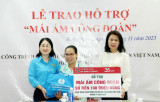Commemorating the 65th anniversary of the Day of Resentment at Phu Loi
On December 1, the Department of Culture, Sports, and Tourism in coordination with the Liaison Committee for Revolutionary Soldiers imprisoned by the enemy in the province organized a Commemoration Ceremony for the 65th anniversary of the Day of Resentment at Phu Loi (December 1, 1958 to December 1, 2023). The ceremony was attended by Nguyen Hoang Thao, Deputy Secretary of the provincial Party Committee, Nguyen Van Loc, Standing Member of the provincial Party Committee, Chairman of the provincial People's Council, Nguyen Loc Ha, Standing Member of the provincial Party Committee, Vice Chairman of the provincial People's Committee, and Nguyen Minh Thuy, Standing Member and Head of the Organization Committee of the provincial Party Committee.
The Phu Loi Prison was constructed in 1957 by the Ngo Dinh Diem regime and the United States ‘empire’ to detain patriotic revolutionaries of Vietnam. The prison operated from 1957 to 1964 and was one of the six largest prisons at the time. Phu Loi Prison was notorious for its inhumane and brutal torture methods, earning it the nickname "Hell on Earth." In particular, on December 1, 1958, the United States - the aggressor - poisoned hundreds of political prisoners at Phu Loi Prison. The poisoning incident has sparked a wave of outrage both domestically and internationally. Despite employing every scheme and malicious tactic, the enemy had failed to extinguish the revolutionary flame in the hearts of the communists.
In his statement at the commemoration ceremony, Nguyen Loc Ha stated that in recent years, the provincial leadership has paid great attention to investing in the preservation, restoration, and renovation of the Phu Loi Prison historical site in order to protect and promote the cultural heritage value of the nation. In the coming time, the Department of Culture, Sports, and Tourism is requested to provide advice to the province on developing a project to promote social investment in various service categories in order to enhance the value of cultural heritage and improve the quality of services for visitors, contributing to making Binh Duong province a destination for cultural heritage tourism, and showcasing the rich revolutionary traditions of its land and people.
Reported by Thu Thao – Translated by Vi Bao
 Provincial leader receives Vietnamese Ambassador to Germany
Provincial leader receives Vietnamese Ambassador to Germany
 NA Standing Committee to convene 39th session
NA Standing Committee to convene 39th session
 Focal dirctive and leadership set for success of all-level Party congresses
Focal dirctive and leadership set for success of all-level Party congresses
 Preparations for all-level Party congresses ensure progress under provincial Party Standing Committee's plan
Preparations for all-level Party congresses ensure progress under provincial Party Standing Committee's plan
 Province's development achievements come from the strength of unity...
Province's development achievements come from the strength of unity...
 Prime Minister chairs Government’s regular meeting
Prime Minister chairs Government’s regular meeting
 PM urges stronger Vietnam - China cultural, tourism links
PM urges stronger Vietnam - China cultural, tourism links
 In seeking for measures to match CPV guidelines and public inspiration
In seeking for measures to match CPV guidelines and public inspiration
 In 2025, province prioritizes capital allocation for key projects
In 2025, province prioritizes capital allocation for key projects
 Vietnam participates in efforts on sustainable management, exploitation of critical minerals: Ambassador
Vietnam participates in efforts on sustainable management, exploitation of critical minerals: Ambassador





